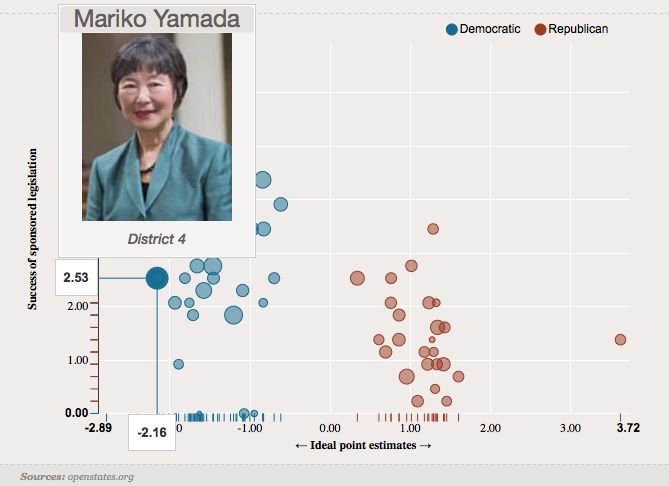Who Says All Democrats Are the Same?

California's state government is changing. Since voters approved the top-two primary system in 2010, a new type of representative has a chance to make it to Sacramento.
At least, that's what Democrat Bill Dodd says. He's running in California's 4th Assembly District.
"The open primary system allowed me to compete and win the election in June" said Dodd. "Never before would a moderate, business-friendly Democrat like me have been able to win in a partisan primary."Source: Sunlight Foundation
California Assembly District 4 is currently represented by Democrat Mariko Yamada. She came to the State Capitol in 2008 as the representative for Assembly District 8. After new district lines were drawn in 2011, she was re-elected to represent District 4 in 2012.
In the 6 years she has spent in the legislature, Yamada became one of the top 5 most ideological Democrats in the Assembly, according to the Sunlight Foundation.
In 2014, however, she cannot seek re-election due to term limits.
Consequently, two new candidates emerged from a heated June primary: Bill Dodd, a Democrat, and Charles Schaupp, a Republican.
The two nearly tied in the primary. Dodd -- now the favorite to win in November -- took first with 26.4 percent and Schaupp received 26.1 percent.
Dodd's top Democratic challenger, who was endorsed by the California Democratic Party, was Dan Wolk. He came in a close third with 23 percent of the vote.
A margin of less than 5 percent separated the top three candidates, and Dodd thinks his message of "putting people above the party" is what made the difference:
"When I said I put people above the party, that was a reference to the vitriolic partisanship that has been going on in Washington, D.C. and Sacramento... This message has been resonating. I figure most of the district is from the middle-left to the middle-right and they were the reason I finished in first place in my race."
So what does all of this mean for the legislature?
While Democrats will likely maintain a majority in the State Capitol through 2016, newly elected candidates are coming to Sacramento with support from voters outside of a single party.
This emerging dynamic comes as the number of California voters who identify as independent has grown steadily over the last decade. According to California's secretary of state, 'No Party Preference' or decline-to-state voters now comprise almost 21 percent of the electorate.
In that time, Republican and Democratic registration has decreased -- down about 7.5 percent and 3.2 percent, respectively.
Editor's note: An earlier version indicated Charles Schaupp's campaign did not respond to a request for comment at the time of publication. His comments had been sent prior to publication, but technical complications delayed delivery.
Image Credit: CA Assembly Website




